Note: This interview is part of a series from Learning Service.
Catherine Cottam is a 29-year-old blogger, activist, and advocate who has lived in the beautiful mountains of Western North Carolina since she was 8. Catherine has her B.S. in Psychology and M.A.Ed. in School Counseling, both from Western Carolina University. She served in the United States Peace Corps for five months in 2013 before being medically separated when she developed Bipolar Disorder. You can read more of Catherine’s work at www.accioadventure.com, and find her on Twitter and Instagram.
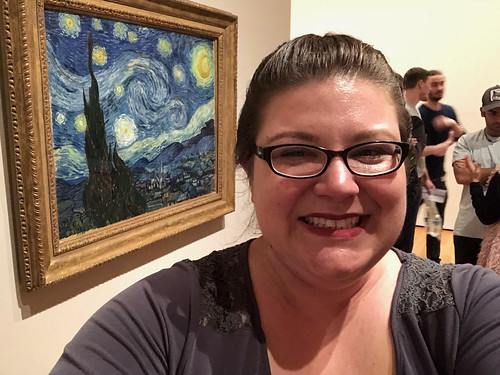
Photo of me with the painting Starry Night in NYC (2018)
What motivated your decision to volunteer abroad? How/why did you choose where to go?
I really wanted to make a positive impact on people struggling in another area of the world. I was working on my M.A.Ed. in School Counseling at the time and specifically really wanted to help children. I wanted to feel like I was making a difference and like my life had some bigger meaning. I also really wanted to visit the continent of Africa because I was thinking of joining the Peace Corps and thought it would be a good trial run to decide if I could live without all of the conveniences I’m used to.
I’m not sure how many people are familiar with the tv show The Vampire Diaries, but one of the stars of the show, Paul Wesley, announced that he and his wife at the time would be going to Kenya to volunteer at an orphanage. I originally was going to go on that trip with them because I LOVED Paul and the tv show, but things didn’t work out with that company, as they charged my account two weeks before they said they would and I didn’t trust them with my safety or my money after that.
I ended up seeking out a different voluntourism company that would take me to Kenya. I was originally supposed to go for one month and one of my best friends from college was supposed to go with me. She had to cancel, so I ended up making the whole trip for about two weeks including a couple of days in London on the way there.
My decision to join the Peace Corps was largely influenced by my experience volunteering in Kenya. I wanted my life to be meaningful and I wanted to make a difference in the lives of children. All of my career aspirations had one thing in common- a desire to help others. I had wanted to join the Peace Corps after college, but my boyfriend at the time told me he would break up with me if I did and that wasn’t something I was ready for yet. After Graduate School, I knew I could deal with going to the bathroom in a hole and not having clean drinking water and having to bathe in a bucket because I had already done it. I was originally invited to be a Peace Corps Volunteer in the Child Development sector, but was later invited to be an Education Volunteer with an earlier start date and was told that if I didn’t accept this placement, I may not be offered another one.
When I applied for the Peace Corps, it was before you could apply for specific countries. I set my first preference as the Continent of Africa and crossed my fingers. I was later invited to serve in South Africa with an arrival date of July 4, 2013.
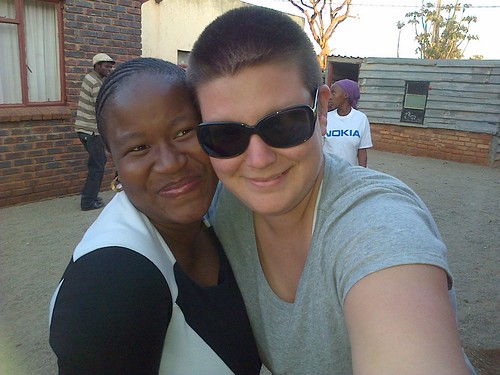
Me and my Peace Corps host sister (2013)
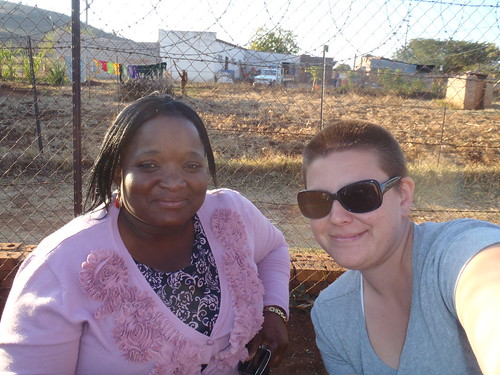
Me and my Peace Corps host mom (2013)
How did you find your job? What resources did you use?
I found out about my volunteer opportunity in Kenya through A Broader View Volunteer Corps. They were largely helpful on the front end, but there was no sense of transparency. I know how much I paid for my trip, but I have no idea how much of that money actually went back to the orphanage. Of the money that did go to the orphanage, little if any of it actually went to help the children, as the owner of the orphanage kept most of it.
I found out about the Peace Corps during an informational session at my college, Western Carolina University. I also found some groups on Facebook related to The Peace Corps and was in contact with volunteers who were in country while I was going through the application process. I read a few books and many many blog posts written by Peace Corps Volunteers to determine if it was a good fit for me.
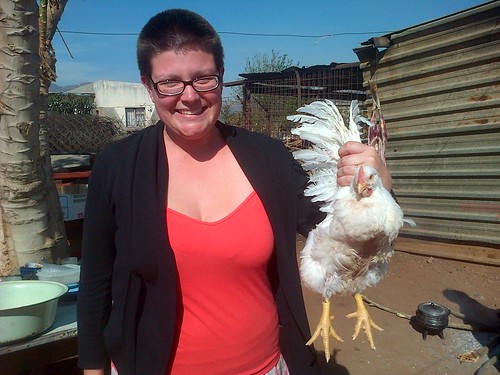
Me with a chicken I would later eat in South Africa during my time in the Peace Corps (2013)
What was your experience like? Can you share some favorite memories - and challenges?
Two things that stick out to me without having to have my memory jogged are when I was sitting in the girl’s dorm with the girls at the orphanage while a girl named Amina braided my hair and talked to me about how she wanted to be a nurse when she grew up, and when another volunteer and I went on safari and at one point we were surrounded by a herd of elephants. This second memory has nothing to do with helping other people or the children at the orphanage, but I think it’s important to remember that me being there was definitely a choice, and that even though I spent some time volunteering, it was still a vacation for me.
There were many challenges at the orphanage where I volunteered. It was winter when I was there and the window in one of the dormitories was broken and had been broken since summer. Some other volunteers and I came across two rooms FULL of donated items that had not been given to the children. One of the biggest challenges came when community members came to donate items like blankets and clothes to the orphanage. The kids really could have used the blankets especially since the window to the dorm was broken. The kids sang and danced for the community members and played soccer with them. After the community members left, the orphanage owner loaded up about half of the supplies in his car and drove off with them. The other half were placed in a locked room. I believe that he may have taken some of the supplies to the other orphanage he owned, but I also believe that many items were sold for profit. It wasn’t until a while after my trip to the orphanage that I found out how damaging voluntourism is for children in orphanages. On top of creating attachment issues by having a revolving door of strangers come into their lives then abandon them again, by donating money to an orphanage I was supporting the institution. Over 80 years of research show how awful institutionalization is for children. I didn’t realize it at the time, but every child at the orphanage had surviving family members and almost all of them had at least one surviving parent. Most children in orphanages aren’t actually orphans. They are often trafficked to orphanages with promises of more food, better health care, and better education from loving families who just want the best for them. This is done to attract donations from volunteers like me to make a profit for the owners of the orphanages.
In terms of the Peace Corps, my favorite memory is definitely the day I decided to go on a walk through my training village and ended up dancing in the streets and singing heads, shoulders, knees, and toes in Sepedi with something like 12-15 Sepedi children. I also have incredibly fond memories of working at my permanent village sorting books for the library with a small group of children I got to know fairly well.
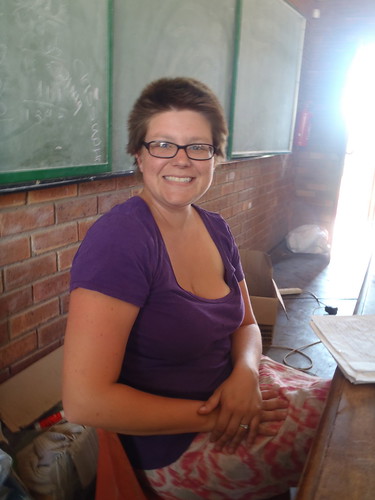
Me in the classroom where I taught in the Peace Corps in South Africa (2013)
The Peace Corps was full of challenges for me, but a large part of that was my rapidly declining mental health. I wasn’t behaving much like myself most of the time I was there. When we arrived, I had never felt so happy in my life. I now believe that was the beginning stages of mania. Specific challenges in the Peace Corps included being sexually harassed and assaulted, feeling homesick, and feeling incredibly isolated. I became severely depressed about a month and a half into service and was even having suicidal thoughts. When I finally told the Peace Corps at the insistence of another volunteer who was my friend, they were swift in getting me treatment. Unfortunately, the antidepressant medication they switched me to made me become fully manic and changed my diagnosis from Major Depressive Disorder to Bipolar I, which the Peace Corps doesn’t have the resources to support in country.

Myself and other volunteers painting a wall at the orphanage in Kenya (2012)
What skills did you develop from your experience? Do you feel changed from your experience abroad?
I didn’t develop any new skills during my experience at the orphanage, but I definitely felt changed from my experience abroad. I left Kenya POSITIVE that the Peace Corps was what I was meant to do. I was energized about helping others and making a positive impact. I also had a new deep and profound gratitude for all of the many privileges in my life.
I learned many skills while in the Peace Corps, including reading, writing, and speaking Sepedi (which I can no longer do very well), classroom management, teaching, and cultural awareness. My experiences abroad with the Peace Corps were incredibly difficult, but definitely shaped me into the person I am now becoming, who is someone I can be proud of.
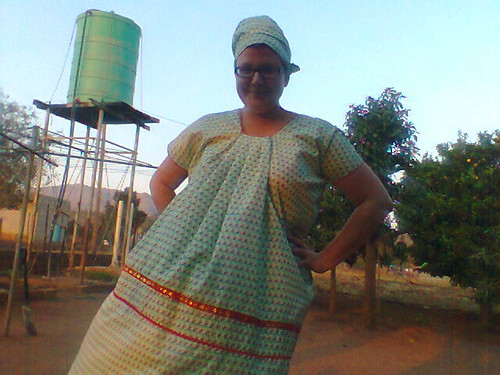
Me in the traditional outfit given to me by my host family in the Peace Corps in South Africa (2013)
Has your experience helped you get to where you are today?
If I hadn’t gone to Kenya to volunteer, I wouldn’t have joined the Peace Corps. If I hadn’t joined the Peace Corps, I may not have developed Bipolar Disorder when I did. Because of that, my volunteer experience in Kenya has really shaped my whole life. It has shaped my life in positive ways, too, though. If I hadn’t gone to Kenya to volunteer, I never would have met the person who put me in touch with Michelle Oliel, who is gracious enough to allow me to volunteer with Stahili, a wonderful organization that works to end the institutionalization of children and get kids out of orphanages and back with their families.
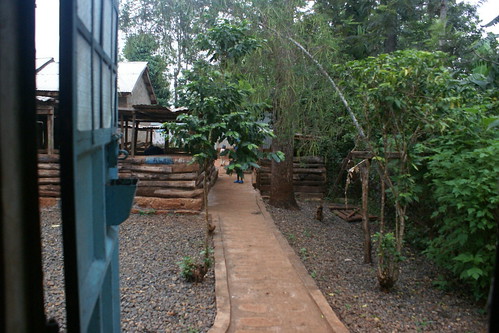
View outside of my door at the orphanage in Kenya (2012)
Any advice for students thinking about volunteering overseas? What are some highlights or things that you gained or changed your perspective?
PLEASE do NOT volunteer in an orphanage. It perpetuates a system that exploits children and is actively harmful. Volunteering at an orphanage may make the volunteer feel good, but it’s not helping the kids you are supposed to be helping. Instead, redirect your support away from orphanages by donating what you would have spent on a plane ticket or in fees to a middle man to organize your volunteer trip to Stahili or another similar organization. You won’t believe how much good an organization like that can do with that much money. If you don’t have money to donate, try donating your time. I remotely volunteer for Stahili and it gives me a great sense of fulfilment without harming anyone. If you can’t do either of those things, try to educate yourself on this issue as much as possible. Stahili puts out an awesome Weekly Media Review about issues in volunteering, with orphanages, and other child rights issues. Working with Michelle and Rob at Stahili has completely changed my perspective on everything related to voluntourism.
If you feel like it’s your calling to volunteer overseas and you really feel like it’s something you have to do, consider joining the Peace Corps or another similar organization that focuses on sustainability and development, places people for more significant amounts of time, has education or work requirements, and places a huge emphasis on training and cultural considerations.
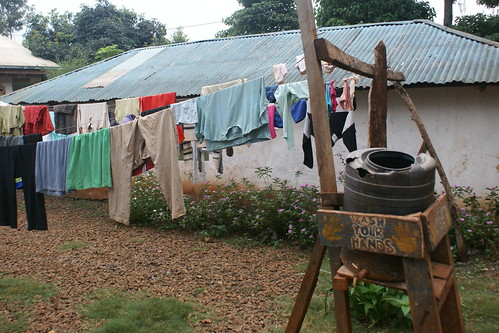
Volunteer clothing on the line at the orphanage in Kenya (2012)
How has international education impacted or influenced your cultural identity?
I find it challenging to answer questions about my “cultural identity” as I am a cis-het white woman. In that sense, I’m not sure that it influenced my cultural identity so much as it influenced all of the ideas I have about culture. It made me incredibly grateful to have been born in the United States of America as that has offered me many privileges. It was definitely a challenge adjusting to things that are culturally unacceptable or uncommon here when they were the norm in Kenya and South Africa. For example, corporal punishment in schools has been made illegal in South Africa but is still widely practiced. Women and children in my community were treated as second-class citizens. It seemed to me that their opinions were not as valued, gender roles seemed very strict, and children were often used for manual labor, even in the middle of the school day. An example of this is that children would be sent to the shop to buy soda for their teachers in the middle of classes. On Fridays, some of the children had to miss class to wash the cars of the faculty members who had them. It was also difficult knowing that FGM was occurring in both Kenya and South Africa during my time in each country. International education has reminded me to be aware of my privilege.
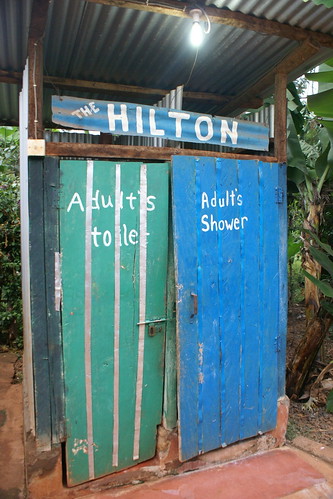
Volunteer "toilet" and "shower" at the orphanage in Kenya (2012)
Is there anything else you'd like to share with us?
I would love it if people would visit http://www.stahili.org/ and http://www.loveyougive.org/ to educate themselves about these important issues. https://www.wearelumos.org/ is another amazing resource.
#VolunteerAbroadBecause: It Will Shape You
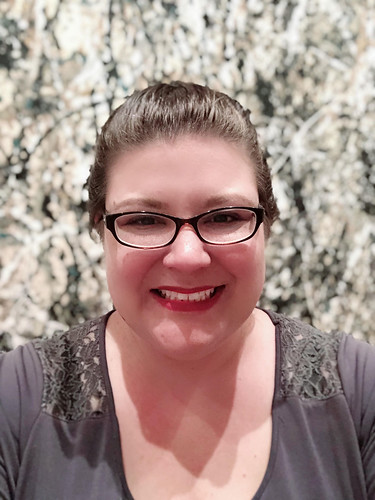
Photo of me in front of a Jackson Pollock painting in NYC (2018)
#ChangeVolunteering
Claire Bennett lives and works in Kathmandu, where she owns a training company, works freelance as a consultant in development and education, and leads study abroad programs for teenagers. She is the co-author of Learning Service: The Essential Guide to Volunteering Abroad.
All photos courtesy and copyright Catherine Cottam
